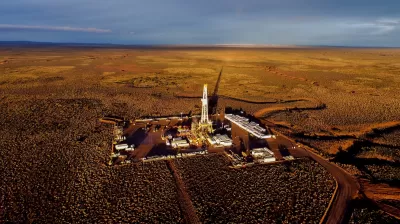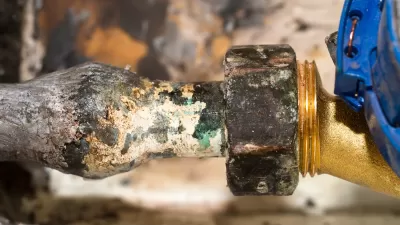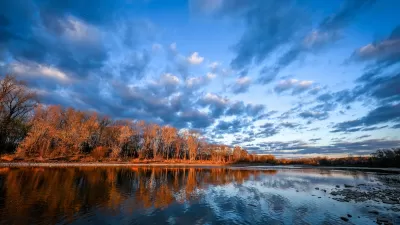Because toxic chemicals used in fracking can contaminate local water supplies, residents in states that require companies to disclose their materials are more likely to increase their bottled water consumption.

A study of jurisdictions that require fracking companies to disclose the chemicals they use reveals that residents tend to take more precautions to avoid potentially contaminated water when they are made aware of the risks, reports Áine Doris in Chicago Booth Review.
Although the U.S. Environmental Protection Agency (EPA) exempts fracking from the Safe Drinking Water Act, eighteen states require fracking operations to disclose the toxic chemicals they use. “The researchers find that those disclosures prompted residents of affected areas to take ‘defensive measures’ such as buying bottled water.”
The study found a 13 percent average increase in the consumption of bottled water between January 2006 and December 2019, “an indication that households responded to the public-information programs and took proactive measures to mitigate their risks and exposure to toxins.” Consumption rose the most in counties with full disclosure of toxic chemicals, but grew by almost the same amount in places where state laws allow companies to withhold some chemicals as ‘trade secrets.’
Ultimately, the study concludes that environmental disclosure programs can drive meaningful change in people’s behavior and risk response.
FULL STORY: When Fracking Chemicals Are Disclosed, Consumers Take Note

Study: Maui’s Plan to Convert Vacation Rentals to Long-Term Housing Could Cause Nearly $1 Billion Economic Loss
The plan would reduce visitor accommodation by 25,% resulting in 1,900 jobs lost.

North Texas Transit Leaders Tout Benefits of TOD for Growing Region
At a summit focused on transit-oriented development, policymakers discussed how North Texas’ expanded light rail system can serve as a tool for economic growth.

Using Old Oil and Gas Wells for Green Energy Storage
Penn State researchers have found that repurposing abandoned oil and gas wells for geothermal-assisted compressed-air energy storage can boost efficiency, reduce environmental risks, and support clean energy and job transitions.

Private Donations Propel Early Restoration of Palisades Playground
Los Angeles has secured over $1.3 million in private funding to restore the Pacific Palisades playground months ahead of schedule, creating a modern, accessible space that supports community healing after recent wildfires.

From Blight to Benefit: Early Results From California’s Equitable Cleanup Program
The Equitable Community Revitalization Grant (ECRG) program is reshaping brownfield redevelopment by prioritizing projects in low-income and environmental justice communities, emphasizing equity, transparency, and community benefits.

Planting Relief: Tackling Las Vegas Heat One Tree at a Time
Nevada Plants, a Las Vegas-based nonprofit, is combating the city’s extreme urban heat by giving away trees to residents in underserved neighborhoods, promoting shade, sustainability, and community health.
Urban Design for Planners 1: Software Tools
This six-course series explores essential urban design concepts using open source software and equips planners with the tools they need to participate fully in the urban design process.
Planning for Universal Design
Learn the tools for implementing Universal Design in planning regulations.
Ascent Environmental
Borough of Carlisle
Institute for Housing and Urban Development Studies (IHS)
City of Grandview
Harvard GSD Executive Education
Toledo-Lucas County Plan Commissions
Salt Lake City
NYU Wagner Graduate School of Public Service





























